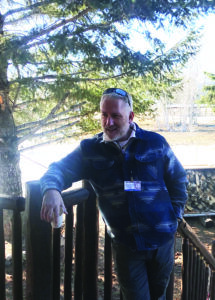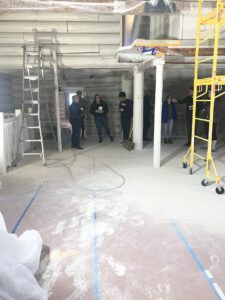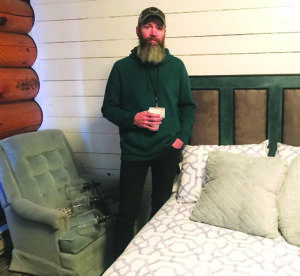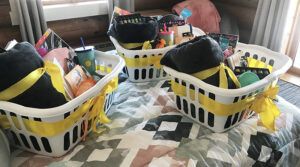
Bitterroot LifeHouse at Crooked Tree Ranch to provide safety, security, and hope
“Human trafficking is alive and well in Montana,” says Lowell Hochhalter, CEO of the LifeGuard Group, a non-profit organizaton that works to end human trafficking. Very soon the Bitterroot Valley will be home to a safe house where former victims can safely rebuild their lives. The LifeGuard Group is readying LifeHouse at Crooked Tree Ranch which, in its initial stages, will accommodate up to six women.

“This is the number one need we’ve seen—to have a place where human trafficking victims can be restored and find the healing they need to successfully rebuild their lives,” Hochhalter says. “LifeHouse will bring that peace.”
Tami and Lowell Hochhalter joined the fight against human trafficking in 2010 and founded the LifeGuard Group in Missoula a few years later. The Stevensville couple has three daughters and one son. About a year ago, they signed a buy/sell agreement on a 40-acre property in the Bitterroot where they plan to open a safe house for former trafficking victims ages 18 and over. The property includes a variety of living spaces and outbuildings. Every bedroom includes a private bath. A full spectrum of therapy including equine, art, nature, and dance, as well as mental health care, will be available, as well as legal assistance and advocacy. Staff will help survivors integrate into society, by providing a family-like setting, healthy social interaction, and job preparation. Eventually the property will accommodate 15 women.
“We’ve been honored to work with some incredible girls and boys that have come out of sex trafficking and we want to have a space for them that they can always come home to,” says Tami. “We want them to experience a life they never thought was possible.”
The Hochhalters have been overwhelmed by the generosity of people who want to support this cause. Groups, businesses and individuals have “adopted” rooms at LifeHouse to renovate and prepare for the new residents. All the work, and the cost, is provided by the adopters.
She said a Gianforte Family Foundation donation will pay off half the mortgage on the $1 million plus property at the foot of the Bitterroot Mountains. Tami said they’ve also received support from the Phyllis & Dennis Washington Foundation, the Gallagher Foundation, the Silver Foundation and Montana Beer & Wine Distributors, as well as many businesses and individuals. Tami mentioned one man who has been sending in $15 a month since he was a teen, when he heard that 15 is the average age of trafficking victims.
The Hochhalters have put together a team to handle various aspects of their organization. Their son Carson is director of operations, Athena Cole is the ranch manager, Joe Danzer is the search coordinator, Megan Bailey is the health care coordinator. Lowell said they are in the process of hiring an in-house manager.
“We’re a team,” said Tami. “This is our dream.”
“It’s amazing how all these roads have crossed for us,” said Lowell.
Megan Bailey, with Cedar Creek Integrated Health, said that LifeHouse will be the only facility in the nation that provides a complete continuum of care for the residents. They will have immediate access to all health services through telehealth, with everything covered by Medicaid. “This is groundbreaking,” said Megan. “Other homes don’t include a mental health care component.”
Tami said they are hoping to be up and running by late spring. The place has been undergoing a major renovation, and the last piece is the kitchen. She said they are already getting calls, there are not enough beds in the U.S. for rescued people. “We’ll be full almost instantly,” she said. The length of the stays are open-ended, because once the healing process starts, it’s not a great idea to interrupt that, said Tami. She added that there could be some short-term “emergent rooms” while a spot is being found for someone. She said they also hope to open a child safe house someday, but the two age groups can’t be together so that will take some additional planning and funding. So, too, will transitional housing, which would be located on different property altogether.
“We want to help to get them retrained, find a safe place to live, and a job,” said Tami.

Joe Danzer is the search coordinator for LifeGuard Group. He said that when they get a call about a runaway or missing person, he works with law enforcement throughout Montana. LifeGuard participated in six recoveries in 2021. Right now, Joe is the person who responds to the situation on behalf of LifeGuard, but he’s hoping to put together a network of quick-response teams around the state, volunteers who would be trained to deal with the situations. He is also trying to get funding for a mobile command unit – the LifeBoat – a trailer that could be pulled by a truck and which would have a work area, living quarters, and room for a private interview. He’s gotten quotes as high as $300,000 but is hoping to find something for around $160,000.
Joe is passionate about his work. By the time he was six, he had lost both his parents. In his adolescence he “went down a dark road.” He said it was hard growing up, with a lot of abuse, both physical, sexual and emotional. He turned to drugs and alcohol. “I was written off,” he said. But then, people reached out to him, and helped him find a better life. He’s now married to Danielle and they have three children, two of whom are adopted.
“We’re not the perfect parents,” said Joe, but his mother’s memory reminds him that, “our kids are loved and valued every day.”
“My mom was my best friend as a six-year-old,” said Joe. “She would love what we’re doing here. She would want to be part of it.” Joe has adopted one of the rooms at LifeHouse, and he has renovated it in honor of his mother.
Brittany, another team member at LifeHouse, has a difficult story to tell. She grew up in Missoula. At 13, Brittany was raped by a neighbor and she became “a bitter, angry teenager.” When she was 19, she met an older man who gave her the attention she was craving. “I was in a bad place, depression-wise, not getting support from my family.” She said she just “fell for” the attention from “an older good-looking guy.”
When she met the older man, she was also coming out of a physically and emotionally abusive relationship. She said they “connected very easily… he preyed on my psychological need.”
When the older man went to jail for promoting prostitution, he told Brittany that they were lying about him, that “he wouldn’t do that.”
He ended up in Deer Lodge, where Brittany visited him often. He brought up the idea of Brittany doing some “escorting” – going on dates with older men for money. “He told me that if I loved him, I would do it for him.”
And so she did. For eight and a half years.
Brittany said that during that time, the man was in and out of prison, and he had his friends watching her. If she tried to quit, he would “threaten to kill my dad, my brother and my niece.”
In March of 2016, he was released from prison and Brittany picked him up. Within two weeks, he was back on dating apps on the internet, trying to find women.
In September of 2016, he was arrested again, and this time the FBI got involved. The trial was in January of 2018 and he was convicted on numerous counts. He won’t be eligible for parole until 2042. The two detectives who arrested him in 2016 “saved my life,” says Brittany.
She met Lowell and Tami two years ago through one of the detectives. Brittany, now 30, is part of the LifeLine Project – she goes to school assemblies to tell her story. She participated in her first one last December.
“I knew I had to work through everything and find a purpose in life,” said Brittany. “My purpose is to share my story, if I help just one person.”
When LifeHouse opens, Brittany’s goal is to “focus on myself and work through everything. This is bigger than me and it’s worth it.”

Danielle, who’s married to Joe and also helps out at LifeGuard, said, “This is what LifeGuard envisions: to have these survivors come out and heal. This place will provide a whole different reality, protected and guarded.”
“I still have a lot of paranoia,” said Brittany. “I always feel he’s watching me… On this property I don’t have to do that and it’s safe.”
“So many things about sexual exploitation are just now coming to light,” said Danielle. “This is the perfect time for this. This is just the tip of the iceberg. There are so many out there.”
According to the LifeGuard Group, nearly 300,000 women and children each year are trafficking victims in the U.S., and only 1 percent of human trafficking victims are ever rescued. The vast majority of trafficking victims are women, and more than half are children.
The LifeGuard Group spearheaded a statewide human trafficking hotline (1-833-406-STOP) in 2020, working with human trafficking groups, law enforcement, businesses, and nonprofits throughout Montana. Last year, the hotline answered 86 calls for help; 89 percent of the victims were female.
Carson Hochhalter said that they are happy to do outreach at schools, and meet with any group that wants to. They can provide training on human trafficking and what to do about it. He said they have a human trafficking hotline, and are looking for 30-60 volunteers for 24-hour shifts. Volunteers can use their own phones and training is provided. He said there is a 2-hour online course and then another 45 minutes of training. “When that phone rings, it’s always scary,” said Carson. “You never know what you’re gonna get.” He said anyone can call if they see something that doesn’t seem right. “We encourage people to call.”
The Montana Hotline number is 833-406-STOP (7867).
Those wanting to support the LifeGuard Group can call 406-396-5053 or visit thelifeguardgroup.org.